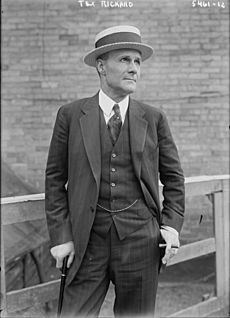History of the New York Rangers facts for kids
The New York Rangers hockey team started way back in 1926. That's when the National Hockey League (NHL) gave a team to Tex Rickard, who founded the Rangers. The team quickly found success, winning the Stanley Cup in just their second season. They would go on to win two more Cups in the next 12 years.
After their Stanley Cup win in 1940, the Rangers faced a really long time without winning a championship. This period became known as the Curse of 1940. This 54-year wait finally ended in 1994. That year, a team led by captain Mark Messier, Brian Leetch, Adam Graves, and Mike Richter won the Stanley Cup. The numbers of these four players have since been retired by the team.
The Rangers' First Years (1926–1967)
In the 1925–26 season, another New York team, the New York Americans, joined the NHL. They played at Madison Square Garden. The "Amerks" were more popular than expected. This made Garden president Tex Rickard want his own team for the Garden. He got his wish, even though he had promised the Amerks they would be the only hockey team there.
Tex Rickard was given a team in April 1926. He first thought about naming them the "New York Giants." But the official name became the "New York Rangers Professional Hockey Club." People say the name "Rangers" came from "Tex's Rangers," either from Rickard himself or the New York newspapers. Rickard even got Toronto Maple Leafs legend Conn Smythe to help build the team.
Back then, new NHL teams didn't get special help to build their rosters. This usually made it hard to create a strong team. But in 1926, the Western Hockey League, a rival league, went out of business. This meant many top players were looking for new teams. Other new teams bought entire rosters from old WHL teams. But Smythe chose to sign the best players from the remaining WHL teams and some players other NHL teams didn't want.
Smythe had a disagreement with Rickard's hockey boss, Col. John S. Hammond. Smythe was fired as manager and head coach just before the first season began. He was paid a large sum of $10,000 to leave. Pacific Coast Hockey Association co-founder Lester Patrick took over. He kept all the players Smythe had chosen. Smythe's way of building the team quickly paid off. The Rangers became a winning team right away. They won their division in their first year but lost in the playoffs. The team's early success made players famous in New York City's exciting "Roaring Twenties" nightlife. Playing at the Garden near Times Square, the Rangers also got their famous nickname, "The Broadway Blueshirts."
In only their second season, the Rangers won the Stanley Cup. They beat the Montreal Maroons three games to two. One famous story from the finals involves Patrick playing in goal at 44 years old. Teams didn't need a backup goalie back then. So, when the Rangers' starting goalie Lorne Chabot got an eye injury, Patrick had to play. He played for two periods in Game 2 of the finals, letting in only one goal. Frank Boucher scored the winning goal in overtime for New York. It was a very quick Stanley Cup win for a new team.
Winning More Cups in the 1930s
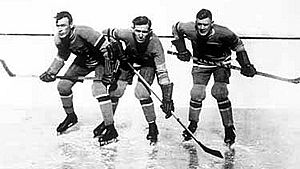
After losing to the Boston Bruins in the 1929 Stanley Cup Finals and having a few average seasons, the Rangers bounced back. Led by brothers Bill and Bun Cook on the wings, and Frank Boucher at center, they won their second Stanley Cup in the 1932–33 season. They beat the Toronto Maple Leafs three games to one. Lester Patrick then stepped down as head coach, and Frank Boucher took his place.
In 1939–40, the Rangers finished second in the regular season. They faced the Boston Bruins in the first round of the playoffs. The Bruins took a 2–1 lead, but the Rangers won three straight games to beat them. This win gave the Rangers a direct path to the finals. They faced the Toronto Maple Leafs in the 1940 Stanley Cup Finals. The first two games were in New York, and the Rangers won both. The series then moved to Toronto, where the Maple Leafs tied it up. But in Games 5 and 6, the Rangers won in overtime. They took the series four games to two, earning their third Stanley Cup.
Tough Times in the Original Six Era (1942–1967)
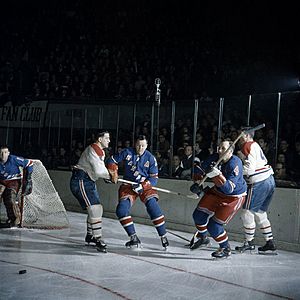
The Rangers struggled a lot in the mid-1940s. They won only 41 games out of 200 between 1942 and 1946. In the 1943–44 season, they had their worst record ever, finishing with only 6 wins, 39 losses, and 5 ties. During that year, goalie Ken McAuley had a very high 6.24 goals against average. This included a 15–0 loss to the Detroit Red Wings, which is still an NHL record for most goals by one team in a game. The Rangers missed the playoffs for five seasons in a row. They made it back in 1947–48 but lost in the first round.
In the 1950 Stanley Cup Finals, the Rangers had to play all their "home" games in Toronto because the circus was at Madison Square Garden. They ended up losing to the Detroit Red Wings in overtime in the seventh game of the finals.
The Expansion Era (1967–1993)
The Rangers missed the playoffs in 12 of the next 16 seasons. However, the team got a fresh start in the late 1960s. This was marked by their move into a newly rebuilt Madison Square Garden in 1968. A year earlier, they made the playoffs for the first time in five years, thanks to rookie goalie Eddie Giacomin and veteran star Bernie "Boom Boom" Geoffrion.
The Rangers reached the finals twice in the 1970s. But they lost both times to very strong teams. In 1972, they lost to the Boston Bruins, who had stars like Bobby Orr. In 1979, they lost to the Montreal Canadiens, who were very dominant.
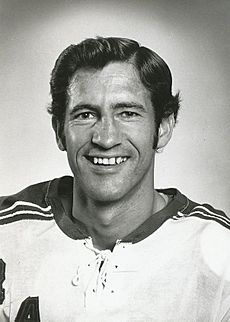
By the 1971–72 season, the Rangers made it to the Stanley Cup Finals. This was despite losing their top scorer Jean Ratelle to injury. Players like Brad Park, Ratelle, Vic Hadfield, and Rod Gilbert (who formed the famous "GAG line" for "goal-a-game") still led them through the playoffs. They beat the Canadiens and Blackhawks but lost to the Bruins in the finals.
A big rivalry started with the New York Islanders, who joined the NHL in 1972–73. The Islanders paid a lot of money to the Rangers to play in their area. In 1974–75, the Islanders beat the Rangers in overtime in a deciding playoff game. This started a rivalry that grew for many years.
After some tough years in the mid-to-late 1970s, the Rangers got Phil Esposito and Carol Vadnais from the Bruins. Swedish stars Anders Hedberg and Ulf Nilsson also joined the Rangers. In 1978–79, they beat the Islanders in the semi-finals but lost to the Canadiens in the finals. However, the Islanders got their revenge, knocking the Rangers out of the playoffs four times in a row starting in 1980–81. The Islanders went on to win four straight Stanley Cups during this time.
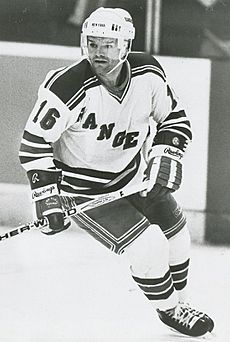
The Rangers remained competitive through the 1980s and early 1990s. They made the playoffs almost every year but never went very far. One exception was 1985–86, when rookie goalie John Vanbiesbrouck helped them upset the Flyers and Capitals. But they lost to the Montreal Canadiens in the next round. The Rangers then got superstar center Marcel Dionne in 1986.
The many playoff losses made Rangers fans believe in the Curse of 1940. People said it started when the Rangers burned their Madison Square Garden mortgage in the Stanley Cup bowl after the 1940 win. Or it was a curse from Red Dutton after the New York Americans team failed. In the early 1980s, Islander fans started chanting "1940! 1940!" to tease the Rangers. Fans in other cities soon joined in.
Frustration was very high when the 1991–92 team won the Presidents' Trophy for the best regular season record. They led their playoff series against the defending champion Pittsburgh Penguins 2–1. But they lost three straight games. The next year, injuries and a very bad finish to the season left the Rangers in last place. Head coach Roger Neilson was fired. The team then hired Mike Keenan, who was known for losing in the finals three times.
The Modern Era (1993–Present)
Ending the Curse: The 1994 Stanley Cup
The 1993–94 season was amazing for Rangers fans. Mike Keenan led the Rangers to their first Stanley Cup championship in 54 years! Two years before, they had gotten center Mark Messier, who had won Stanley Cups with the Edmonton Oilers. Adam Graves, also from the Oilers, joined the Rangers. Other former Oilers on the team included Esa Tikkanen and later Craig MacTavish and Glenn Anderson. Graves set a team record with 52 goals that season.
The Rangers won the Presidents' Trophy by having the best record in the NHL. They had 52 wins, 24 losses, and 8 ties, setting a franchise record with 112 points.
The Rangers easily got through the first two rounds of the playoffs. They swept the New York Islanders and then beat the Washington Capitals in five games. But things got exciting in the conference finals against the New Jersey Devils. The Rangers lost Game 1 at home in double overtime. They won the next two games, but the Devils then won two games. The series went back to New Jersey for Game 6. The day before, Rangers captain Mark Messier famously promised a win. Keenan said Messier was telling his teammates he believed they could win.
In Game 6, Messier delivered on his promise. He scored three goals in the final period to lead the Rangers to a 4–2 win. This set up a Game 7 back at Madison Square Garden. The Rangers won Game 7 2–1 when Stephane Matteau scored a goal in double overtime. This sent the team to the Stanley Cup Finals for the first time since 1979.
In the finals, they played the Vancouver Canucks. The Rangers lost Game 1 at home in overtime. But they bounced back and won the next three games, allowing the Canucks only four goals. This set the stage for a Game 5 Stanley Cup celebration at home. It was the first time the team could win a Cup at the Garden.
That night, the Canucks were leading 3–0 early in the third period. Even though the Rangers tied the game, Vancouver took the lead again and won 6–3. New York's hopes were shaken again when the Canucks won Game 6. Keenan told his players to be proud and enjoy the moment of playing a Game 7 at home for the Stanley Cup.
Game 7 was a classic. The Rangers took a 2–0 lead in the first period. But Vancouver captain Trevor Linden scored a short-handed goal. Messier scored again on a power play to make it 3–1. Linden scored another goal early in the third, but the Rangers held on to win 3–2. The Garden erupted in cheers and tears. Mark Messier's celebration and his acceptance of the Stanley Cup became famous images. He became the first player to captain two teams to the Stanley Cup.
Brian Leetch became the first American-born player to win the Conn Smythe Trophy for playoff MVP.
Big Player Signings (1994–2004)
Even after coaching the Rangers to the Stanley Cup, head coach Mike Keenan left because of a disagreement with general manager Neil Smith. In the 1994–95 season, which was shorter due to a lockout, the Rangers struggled. They lost in the second round of the playoffs.
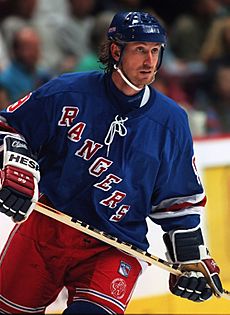
The Rangers signed an older Wayne Gretzky in 1996. But even with "The Great One," the team didn't do as well. Their 1994 stars were getting older, and many retired or played worse. Gretzky's biggest achievement was leading them to the 1997 Eastern Conference finals. They lost 4–1 to the Philadelphia Flyers. After GM Neil Smith let Mark Messier leave, the Rangers began a streak of seven seasons without making the playoffs. This happened even though they usually had the highest player salaries in the NHL.
In 2000, Smith was fired, and Glen Sather took over. By the end of the 2000–01 season, the Rangers had many star players. Mark Messier returned, Theoren Fleury joined, and Eric Lindros was traded to the Rangers. They also got Pavel Bure in 2001–02. Despite these expensive players, the Rangers still missed the playoffs. Later, other stars like Jaromir Jagr were added, but the team still missed the playoffs in 2002–03 and 2003–04.
A New Start After the Lockout (2005–2014)
Towards the end of the 2003–04 season, GM Glen Sather finally decided to rebuild the team. He traded away players like Brian Leetch and Alexei Kovalev for younger players and draft picks. With many older stars gone, the Rangers focused on talented young players under new head coach Tom Renney. However, the team's main focus was still on veteran superstar Jaromir Jagr.
Many expected the Rangers to struggle in the 2005–06 season. But thanks to amazing play from Swedish rookie goalie Henrik Lundqvist, Martin Straka, and Jagr, the Rangers had their best record since 1993–94.
Jagr broke the Rangers' single-season points record with 110 points. He also scored his 53rd goal of the season, breaking Adam Graves' club record. The Rangers clinched a playoff spot for the first time since 1997. In the playoffs, they lost to the New Jersey Devils in four games.
Expectations were high for the 2006–07 season. The Rangers signed Brendan Shanahan, a veteran star. On October 5, 2006, Jagr was named the first team captain since Mark Messier retired. The Rangers started slow but improved in the second half, thanks to Lundqvist's great goaltending. They also got Sean Avery, a forward who brought new energy to the team. The Rangers made the playoffs for the second year in a row. They swept the Atlanta Thrashers in the first round but lost to the Buffalo Sabres in the next round.

At the 2007 NHL Entry Draft, the Rangers picked Alexei Cherepanov. The Rangers also signed two high-profile centers, Scott Gomez and Chris Drury. These moves made the Rangers look like strong Stanley Cup contenders. They made the playoffs for the third year in a row and reached the second round. However, they lost to the Pittsburgh Penguins. After this, captain Jaromir Jagr left to play in Russia. Chris Drury was named captain on October 3, 2008.
The Rangers started the 2008–09 season strong, setting a franchise record for best start. But a disappointing second half followed. Coach Tom Renney was fired in February 2009, and John Tortorella took over. The Rangers made the 2009 playoffs but lost to the Washington Capitals in seven games. In June 2009, the Rangers traded Scott Gomez and then signed superstar Marian Gaborik.
In the 2009–10 season, the Rangers missed the playoffs for the first time in five years. Gaborik had a great season with 42 goals. The Rangers played inconsistently. The final game of the season was against the Philadelphia Flyers, and it decided who would make the playoffs. The Flyers won in a shootout, sending them to the playoffs instead of the Rangers.
For the 2010–11 season, the Rangers made changes to their team. They also wore a new "Heritage Jersey" for some games. For the second year in a row, their playoff fate came down to the final day. They beat the New Jersey Devils. They needed the Carolina Hurricanes to lose their final game, which they did. This put the Rangers in the 2011 playoffs. They faced Washington in the first round and lost in five games.
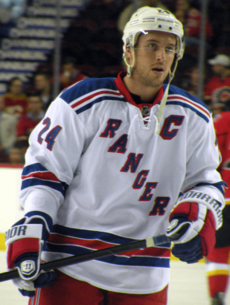
On May 13, 2011, player Derek Boogaard passed away. On June 29, 2011, the Rangers bought out captain Chris Drury's contract. Then, Brad Richards signed a big contract with the Rangers. On September 12, 2011, Ryan Callahan was named the 26th captain in Rangers history.
In the 2011–12 season, the Rangers finished as the top team in the Eastern Conference. They had 51 wins and 109 points. Marian Gaborik was their top scorer with 41 goals. In the playoffs, they faced the Ottawa Senators and won in seven games. In the next round, they beat the Capitals in seven games, reaching the Eastern Conference finals for the first time since 1997. They faced their rivals, the New Jersey Devils. After leading the series 2–1, the Rangers lost three games in a row, ending their season.
In July 2012, the Rangers traded for Rick Nash, an All-Star player. At the 2013 NHL trade deadline, they traded Marian Gaborik. After losing in the playoffs to Boston, head coach John Tortorella was fired. In June 2013, Alain Vigneault was introduced as the new head coach.
Reaching the Finals Again (2013–2014)
On March 5, 2014, the Rangers traded captain Ryan Callahan for Martin St. Louis. This trade happened because the Rangers and Callahan couldn't agree on a new contract. During the regular season, the Rangers set a franchise record with 25 road wins. In the 2014 playoffs, New York beat Philadelphia in seven games. In the next round, the Rangers came back from being down 3–1 in the series to beat Pittsburgh in seven games. This was the first time in their history they had done such a comeback. They then beat the Montreal Canadiens in six games to become the Eastern Conference champions. This sent them to the Stanley Cup Finals for the first time in 20 years.
In the finals, they faced the Los Angeles Kings. The Rangers led the first two games by two goals but lost both in overtime. They were then shut out 3–0 in Game 3 at home. The Kings outshot the Rangers in Game 4, but the Rangers won 2–1 to avoid being eliminated. They had another lead in Game 5, but the Kings tied the game and won in double overtime. This gave Los Angeles the Stanley Cup.
From 2014 to Today

On October 6, 2014, defenseman Ryan McDonagh was named the Rangers' 27th captain. In the 2014–15 season, the Rangers won the Presidents' Trophy for the third time. They had the best record in the NHL with 53 wins and 113 points, both franchise records. They also won 28 road games, breaking their own record.
In the playoffs, the Rangers beat the Pittsburgh Penguins in five games. They then came back from a 3–1 series deficit again to beat the Capitals in seven games. This made them the first NHL team to come back from a 3–1 deficit in two seasons in a row. This sent them to the Eastern Conference final for the third time in four years. However, after winning Game 1 against the Tampa Bay Lightning, the Rangers lost Game 2 badly. The series went to Game 7 in New York. The Lightning shut out the Rangers 2–0, ending their season. This was the first time the Rangers had lost a Game 7 at home in their history.
In July 2015, Glen Sather stepped down as GM, and Jeff Gorton took his place. Martin St. Louis announced his retirement.
The Rangers started the 2015–16 season very well, with a nine-game winning streak. But they struggled in the winter. In February, they improved. On February 28, the Rangers traded for Carolina Hurricanes' captain Eric Staal. The Rangers finished third in their division with 101 points. Despite high hopes, they were eliminated by the Pittsburgh Penguins in the first round of the 2016 playoffs.
In June 2016, the Rangers got Nick Holden. They also re-signed J. T. Miller, Chris Kreider, and Kevin Hayes. In July, the Rangers traded their top scorer Derick Brassard for Mika Zibanejad. They also signed Michael Grabner and college star Jimmy Vesey. In the next season, the Rangers earned 102 points and made the playoffs. They beat Montreal in the first round but lost to the Ottawa Senators in the next round.
After the playoff loss, the Rangers traded Stepan and Raanta. They also signed All-Star defenseman Kevin Shattenkirk. The 2017–18 season started slowly for New York. After an overtime win in the 2018 NHL Winter Classic, the Rangers struggled. In February, the Rangers announced they planned to rebuild their team. Several popular players were traded, including Rick Nash, Ryan McDonagh, and J. T. Miller. The Rangers missed the playoffs for the first time since 2010.
After the season, Vigneault was fired, and David Quinn became the new head coach. During the 2018 draft, they picked Vitali Kravtsov, K'Andre Miller, and Nils Lundkvist. In another rebuilding season, the Rangers traded away more familiar faces like Mats Zuccarello and Kevin Hayes. They missed the playoffs again. But Zibanejad had a great season with 30 goals. After the season, the Rangers got defenseman Jacob Trouba and prospect Adam Fox.
The Rangers got lucky in the 2019 draft lottery and moved up to the second pick. They used it to pick Finnish winger Kaapo Kakko. The Rangers also made a big splash in free agency by signing Artemi Panarin. The Rangers started Panarin's first year slowly. But an 11–4–0 record in February put them back in the playoff picture. Zibanejad led the team with 41 goals, and Panarin had 95 points. The NHL season was stopped on March 12 due to the COVID-19 pandemic. When the league restarted, the Rangers were invited to a 24-team tournament. But they were swept by the Carolina Hurricanes in the qualifying round.
After being eliminated, the Rangers won the 2020 draft lottery, getting the top pick. They used it to pick top prospect Alexis Lafreniere. During the off-season, the Rangers traded Marc Staal and bought out Henrik Lundqvist's contract. This left Kreider as the only player from their 2014 Eastern Conference-winning team. In a shorter 56-game season, the Rangers had a decent record. But they faced several challenges. DeAngelo was waived, Panarin took a leave of absence, and coach Quinn was sidelined due to COVID-19. The Rangers missed the playoffs on May 3. General manager Jeff Gorton and team president John Davidson were fired. Chris Drury took over both roles. Quinn and his staff were also fired.
In June 2021, the Rangers hired Gerard Gallant as their new head coach. They added several physical players, including Barclay Goodrow and Ryan Reaves. Led by new goalie Igor Shesterkin and a great season from Kreider, the Rangers finished second in their division. Kreider scored 50 goals. In the playoffs, the Rangers lost three of their first four games against the Pittsburgh Penguins but came back to win the series in seven games. They then beat the Hurricanes in seven games. But they were eliminated by the Tampa Bay Lightning in six games in the Conference Finals.
By the end of the next season, the Rangers had gotten Vladimir Tarasenko and Patrick Kane. The team finished third in their division and made the playoffs again. However, they lost to their rivals, the New Jersey Devils, in seven games, even after leading the series 2–0. As a result, Gallant was fired and replaced by Peter Laviolette.
The Rangers set new records in the 2023–24 season. They earned their 3,000th regular season victory, becoming the fifth team to reach this milestone. They also won a thrilling game in the 2024 Stadium Series, beating the Islanders 6–5. The Rangers had a franchise-record 55 wins and 114 points, winning the Presidents' Trophy for the fourth time. In the playoffs, the Rangers won their first seven games, sweeping Washington and beating Carolina in six. They then took a 2–1 series lead against the Florida Panthers in the Eastern Conference finals. But they lost the last three games, ending their season.
See also
 | Anna J. Cooper |
 | Mary McLeod Bethune |
 | Lillie Mae Bradford |


